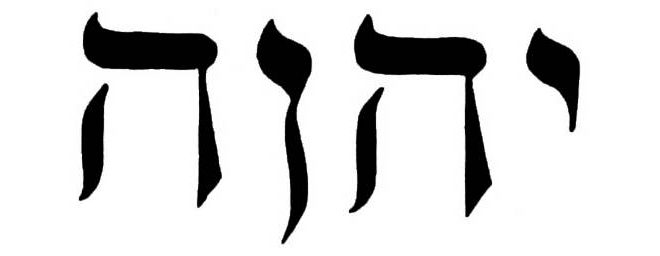In his vision of God at the burning bush, Moses learned two different, but related, names of God. The first was ehyeh asher ehyeh, commonly translated “I AM THAT I AM.” This was the first-person name of God, or the name he used when He and His prophet were conversing directly. Interestingly, God chose another name for Moses to use in the third person, or when he was later conversing with the Israelites about their God. The name God chose for this usage was YHWH.
These four letters (also called the Tetragrammaton) almost certainly comprise a word formed from the Hebrew root /hyh/, “to be or become” (much like “ehyeh” above). The change in middle consonant can be explained by the fact that at times the “y” in /hyh/ would be replaced with “w” in ancient “to be” formations, rendering the root /hwh/. Related is the Aramaic root /hw[aleph]/, “to come to pass, to come to be or exist.” Adding the prefix y- to these roots forms the masculine third person singular. Therefore, someone speaking ancient Hebrew but unfamiliar with the word YHWH would expect it to represent some parsing of “He becomes” or “He comes to be.” Modern theologians (perhaps wanting to tie YHWH to “I am that I am,” more about this later) generally take it to mean “He is,” and interpret that as a statement on the uncreated, eternal, unchanging nature of God. As meaningful and inspiring as this is, it is also an incomplete picture of the significance I believe God intended to communicate when he chose this name.
The Hebrew scriptures, as many are aware, include only consonants. The vowels (and hence the entire word) are almost always easily inferred, but in this case there are three options. Possible conjugations using the four consonants in the Tetragrammaton are yihweh (qal stem imperfect) “he will be or become,” yahweh (hiphil stem imperfect) “he causes to be or become or he will cause to be or become,” and yāhweh (hophal stem imperfect) “he will be caused to become.” Of these, the hiphil, or causative, “Yahweh” seems to best fit the character of God, and, more importantly, only the hiphil vowel usage matches the name of God found elsewhere in the O.T., including both the shortened form “Jah” and the prefix or suffix used to add God’s name to other words and names. The hiphil form is therefore the one we accept. Under this reading, YHWH (or its romanization, Jehovah) may be considered to mean any of the following: He causes or will cause to exist, he brings or will bring about or bring to pass, he causes or will cause to become.
Some examples found in Old Testament names are Jeremiah (typically rendered “Jehovah exalts,” but, under this construction, “He will raise” or “He will cause to be exalted,” or “He will bring about exaltation”), Zechariah (usually “Jehovah has remembered,” now “He will cause to be remembered,” or “He will bring about remembrance”), and Joshua (originally Yehoshua, “Jehovah saves,” now “He will cause to be saved,” or “He will bring about salvation”). Incidentally, Joshua (or Yeshua) is the name transliterated in the Greek New Testament as Iēsous, and which made its way eventually into English as Jesus. This new interpretation certainly sheds light on Matthew 1:21, among many other verses.
Interestingly enough, this reading of YHWH also sheds light on eyheh asher ehyeh, because a causative interpretation of the name of God helps resolve some ambiguity about the meaning of ehyeh. It turns out that, in the Old Testament, the word ehyeh is never used to mean “I am” in the simple declarative way an English speaker would expect, but is instead used in the context of covenants. A perfect example is Jeremiah 32:38: “And they shall be my people, and I will be their God.” The implication here is that the relationship of God to Israel will change, so this I will be can be more accurately understood as I will become. Throughout the Old Testament, anywhere God uses this word, it is invariably part of a statement intimately connected with His attitude about the one He is speaking to. New Testament passages rendered “I am” can be understood in a similar light. This understanding of ehyeh is only enhanced by our chosen interpretation of the Tetragrammaton.
We should mention that this causative translation of YHWH is controversial for two reasons: first, though it is agreed the /hwh/ hiphil stem masculine third person singular imperfect would grammatically be expected to take the form “yahweh,” that conjugation is not used anywhere (apart from the name of God itself). Thus, scholars claim that particular formation of the verb simply doesn’t exist. Secondly, in this form, it would be expected to be a transitive verb (i.e. there must be a direct object), and a suitable object candidate does not always follow the name of God.
The first objection, while reasonable, can be overcome by considering that the Jews’ natural aversion to taking the name of God in vain would have led them, once the Tetragrammaton was revealed to Moses, to find other verbs with which to express the idea of “He shall cause to be,” both to eliminate ambiguity, and to avoid overloading the name of deity. Hence, the fact that the form YHWH is unused as a verb does not necessarily mean it never existed or isn’t grammatically correct; it could simply mean it was reserved for special use before the authoring of the Hebrew Scriptures (or of the surviving copies).
The second problem (the missing object) also seems not to be a major obstacle to accepting this interpretation when one considers that 1) when used as a verb, YHWH would of course naturally have an object, but (as discussed above) that usage was abandoned, 2) even when used as a name, YHWH occasionally does take an object, specifically when creating another name, as in Jeremiah and others listed above, 3) when the object is missing, we may imagine the implied object to be some specific person, or all people, or some aspect of nature, as these are all God’s creations; and the process of imagining leaves to the reader the profitable exercise of deciding, and 4) when the context allows both interpretations, (i.e. the name of God and a verb with object—for example, the Old Testament usage “Lord of Hosts”) that usage is illustrative and possibly even intentional. So, the example “YHWH of Hosts,” is alternatively a title and a sentence meaning “He will cause armies to exist” or “He will cause [us?] to become a [heavenly] army.” (The heavenly modifier might also be inferred, as it is God, and not some earthly king, doing the recruiting.)
Thus the name Yahweh testifies, by its very construction, to the nature of God both as a creator (he will cause to exist) and as a shaper (he will cause to become). It can also be seen as reinforcing (or, indeed, introducing) the Latter-day Saint idea that God’s ultimate goal is to turn man into beings like him. Since in Hebrew the “is” is generally understood rather than stated in simple declarative sentences, saying “Yahweh is good” (in linear translation, “Yahweh good”) is grammatically identical to saying “He will cause to become good.” Though the direct object must often be inferred (i.e. we must guess who or what He will create or change), we are helped in that process by three ideas: first, the context often gives clues; second, when one considers that God cannot cause anything to become good that is already completely good, the object must be something imperfect (and “good” doesn’t have to be the predicate; any adjective following the name of God is subject to similar reasoning); and third, if the Book of Moses is to be believed, God’s principal work, and the source of his glory, is guiding man through the process of gaining eternal life—is perfecting him. Thus, if the interpretation of YHWH is “he causes to exist,” the object will likely be given in the surrounding text, but if the meaning is “he will cause to become,” an unspecified object is likely “humankind,” which can be stated more personally as “us,” or even, “me.”
Following this reasoning, in choosing to introduce himself to Moses as Yahweh, God bore testimony of the lengths he would go to to transform His children to be like Him, since (in Hebrew, at least, with its tacit “is”) there is no way to describe God Himself without also saying that God is shaping man toward worthiness of that same description. In other words, if Yahweh [is] powerful, just, and kind, then He is causing (or will cause) us to be powerful, just, and kind. Is God merciful? Then He is causing someone else to become merciful. These two ideas are both conveyed in the same words, and so Yahweh can never be praised without making a corresponding guarantee that we can one day merit such praise ourselves. The name God gave Moses is therefore both profoundly descriptive and infinitely generous.
The ultimate promise is His full name, used several times in the Hebrew Scriptures: Jehovah Elohim, the Lord our God. “Elohim”—“God,” though typically (mis)translated in the singular, is undeniably a plural form of its root word. Thus the title “The LORD our God” given to Jehovah in the Old Testament can also be accurately rendered “He shall cause [us] to become Gods.”
Jehovah Elohim, the Lord my God, is turning me into someone like Him. One day, he will call me by his name, a name that is itself the promise of my royal heritage. And God keeps His every promise.
—Mark Holt

